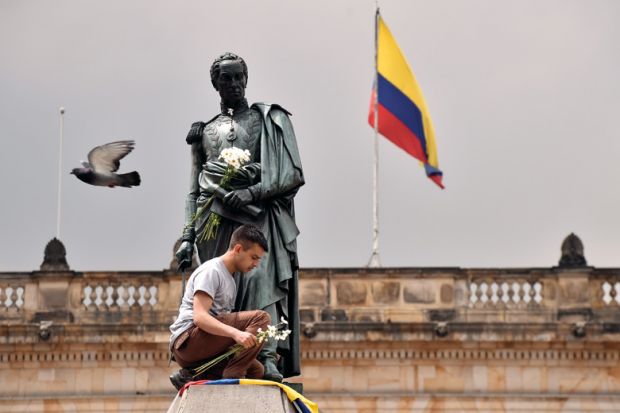The president of a Colombian university has set out the many ways that higher education can still contribute to peace-building in his country.
José Manuel Restrepo-Abondano, who heads Del Rosario University – one of the country’s oldest and most prestigious institutions – was speaking at a seminar organised by the University of Bath’s International Centre for Higher Education Management (ICHEM) and the Society for Research into Higher Education.
Although it was obviously a setback that the historic settlement between the Colombian government and the Revolutionary Armed Forces of Colombia (Farc) had not been ratified in the referendum of 2 October, he argued that universities still had a major role to play in trying to cement peace.
Academic research on education and peace, explained Dr Restrepo-Abondano, offered a number of key insights.
Education could “help develop identities and deal with the legacies and grievances of previous conflict, improving social cohesion and moving societies towards reconciliation”. It could “reduce the risk of conflict, if a population feels provided for” and, by developing skills, “can help reduce the risk of people turning to or returning to conflict, and can support economic regeneration”. Yet it needed to be “inclusive and accessible”, to “address inequality and exclusion and provide opportunities for previously marginalised communities”. Sensitivity was also essential to “ensure that curricula and delivery do not reinforce inequalities or create divisions”.
Colombia’s leading universities, Dr Restrepo-Abondano went on, had long been “key players in the consolidation of democracy and the movement towards peace”.
His own institution was a leader within the Alliance of Universities for Peace and had set up both a Centre for Peace and Conflict Studies and a School for Peace. The latter operates across all the faculties of the university but focuses strongly on local issues and bringing together diverse communities that would not usually be in contact.
To ensure that the university continues to contribute to peace-building, Dr Restrepo-Abondano described how it had set out a plan of action for the next three decades based around three major programmes.
“Transforming lives, empowering people” aimed to provide the training, capacity-building and psychological support to enable communities to make the transition to sustainable peace. “Educating for diversity, forming new generations” was designed to create “a cathedral of peace” and to ensure that all undergraduates embraced an attitude of forgiveness and reconciliation, while also offering new scholarships to students from the poorest and most violent towns of Colombia. Finally, “Moving frontiers, envisioning sustainable peace” would draw on the power of research to help overcome challenges relating to the traumas of war, environmental degradation and the need to prevent further outbreaks of violence. To that end, the university had created an interdisciplinary group that would address head-on issues such as inequality, transitional justice, access to public goods and political participation.
Responding to Dr Restrepo-Abondano’s presentation, Rajani Naidoo, director of ICHEM, stressed that “the derailing of the peace accord does not signal the end of the peace process. We know from countries such as Northern Ireland, the Philippines and South Africa that there are often numerous failed attempts before peace is achieved and that the process can work across generations. The referendum was lost on a tiny percentage (50.2 per cent opposed the deal and 49.8 supported it), so there is still a huge appetite for peace in Colombia.”
Despite strongly polarised views on “the extent of punishment for the past crimes of the guerrillas” and the need to “mak[e] Colombian society more equal”, Professor Naidoo believed that “negotiations are likely to continue” and that “universities will remain key actors in the peace process”.
“Policy-relevant research on key social, political and economic issues to make peace more viable in Colombia will be fundamental. Universities can also open up safe spaces for public discussion on how to go forward,” she added.
“Universities have already integrated peace education in the curriculum, and facilitating conversations among young people, particularly those who are marginalised, on the causes of conflict and negotiating without violence will be crucial in creating a climate that is conducive to peace.”
POSTSCRIPT:
Print headline: Colombian academy can still help build peace despite vote
Register to continue
Why register?
- Registration is free and only takes a moment
- Once registered, you can read 3 articles a month
- Sign up for our newsletter
Subscribe
Or subscribe for unlimited access to:
- Unlimited access to news, views, insights & reviews
- Digital editions
- Digital access to THE’s university and college rankings analysis
Already registered or a current subscriber?






